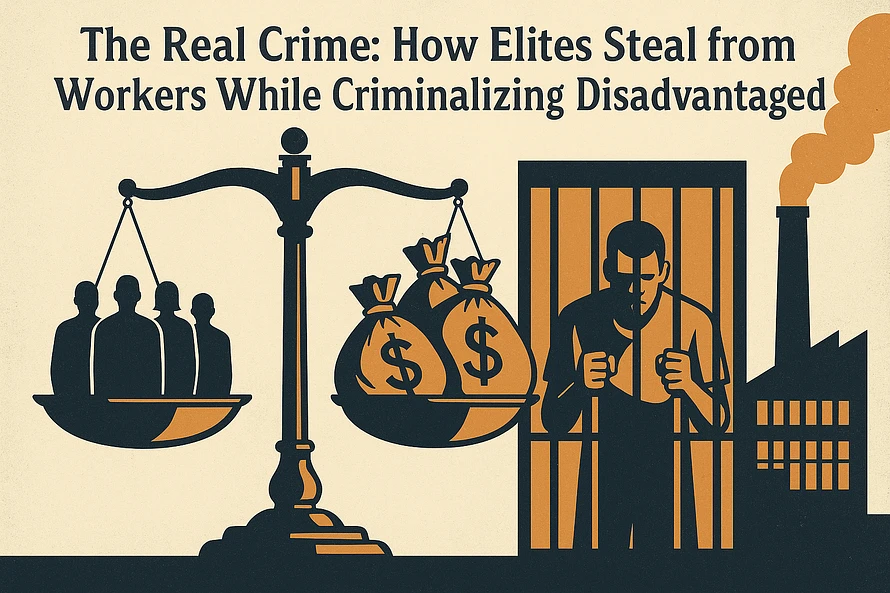The Real Crime: How Elites Steal from Workers While Criminalizing the Disadvantaged

(From the R2R Initiative – Resistance to Renaissance & the System Resistance League)
Throughout history, those in power have often claimed to be “tough on crime.” Yet the reality is that their definition of crime rarely points upward at exploitation and corruption. Instead, the weight of punishment falls on the disadvantaged—on those struggling to survive in systems tilted against them.
Policies slash social supports, criminalize poverty, and punish desperation, while those with wealth and connections are granted loopholes, pardons, or quiet immunity. In practice, being poor is treated like a crime, while being powerful is treated like a license.
But from the perspective of the Resistance to Renaissance (R2R) Initiative and the System Resistance League, the deeper crime is clear: the systemic theft of wealth from working people by elites who hoard the gains of productivity.
When Wages and Productivity Grew Together
There was once a time when the American economy rewarded labor fairly. If workers produced more, they earned more. Families could expect a better life through hard work. Productivity and wages rose together.
That balance shattered in the 1970s. Productivity continued to climb, but wages flatlined. The wealth created by millions of workers was siphoned upward, not shared. Today, CEOs make hundreds of times more than the people who keep their companies running, and billionaires have amassed fortunes so vast they distort democracy itself.
The Scale of Distortion: One Billionaire vs. Millions of Voters
How distorted? Consider this:
-
In the 2024 election cycle, just 100 billionaire families contributed $2.6 billion to federal elections—about one-sixth of all spending.
-
A small handful of mega-donors now provide a larger share of funding than millions of ordinary citizens combined.
-
Research shows economic elites have a direct, independent influence on policy outcomes, while the opinions of average voters have little to no measurable effect.
That means in practice, a single billionaire can have more political sway than millions of ordinary citizens put together. Democracy is being warped not by the voices of the people, but by the wallets of the few.
Debunking the Myth of “Deserved” Greed
One of the most damaging lies in our culture is the belief that billionaires and corporations deserve to hoard the gains of productivity while workers do not. This myth is repeated endlessly: that the wealthy “earned” their fortune through brilliance, hard work, or risk-taking, and therefore it is just. Meanwhile, workers are portrayed as interchangeable, unskilled, or undeserving of a fair share.
But this narrative collapses under scrutiny:
-
Workers create the value. Every product built, every service delivered, every line of code written—none of it exists without labor. Productivity gains are collective achievements, not the work of one “genius” at the top.
-
Wealth is systemic, not individual. Billionaires depend on public infrastructure, legal systems, and generations of publicly educated workers. Their fortunes ride on structures built by society, not by themselves alone.
-
Excess is not merit—it’s exploitation. No single person can morally “deserve” billions when millions of others struggle to survive. Hoarding is not proof of worth; it is proof of a system that channels collective gains into private vaults.
-
Risk is not equal. Workers risk their health, their time, their futures every day. Yet only the elite are rewarded disproportionately under the banner of “risk.”
Greed is not a virtue. It is not proof of hard work. It is the legalized theft of collective wealth. The idea that billionaires deserve what workers created is the final trick of the system—conditioning people to defend their own exploitation.
Criminalizing Poverty, Excusing Exploitation
Meanwhile, laws and policies crack down hardest on those at the bottom. The unhoused are penalized for seeking shelter. The hungry are shamed or prosecuted for theft. Families who fall behind are treated as irresponsible rather than as casualties of a rigged system.
At the same time, systemic looting—pensions raided, jobs offshored, tax laws tilted, wages suppressed—goes largely unpunished. The crimes of poverty are punished, while the crimes of power are legitimized.
The R2R & System Resistance League Perspective
R2R and SRL insist on redefining what we call “crime.” It is not a crime to be disadvantaged. It is not a crime to need help. The true crime is exploitation: hoarding human potential, siphoning wealth, and weaponizing shame to keep people compliant.
From Resistance to Renaissance, the path forward is twofold:
-
Resistance means calling out this theft and refusing to accept the normalization of criminalized poverty. This is where the System Resistance League stands on the front lines—naming the injustice and organizing against it.
-
Renaissance means building systems of solidarity, cooperation, and dignity—where the gains of human progress are shared, not stolen.
A Call to Action
The R2R Initiative and the System Resistance League affirm this truth: the greatest theft in America is not the petty crime of survival—it is the grand larceny of elites who steal the future from workers while buying themselves immunity.
To respond, we must both resist the structures of exploitation and build the seeds of a new renaissance grounded in dignity and justice.
It is time to stop criminalizing the poor and start dismantling the systems that empower the powerful at everyone else’s expense. That is the only path from Resistance to Renaissance.
Afterword: Why Trump Is Not Named
Some readers may wonder why a figure like Donald Trump is not named directly in this article. The decision is intentional. His name provokes strong emotions, often shutting down meaningful dialogue. Defenders reflexively shield him, critics immediately sharpen their outrage—and the systemic reality gets lost in the noise.
The truth is bigger than one man. Trump is not the origin of this pattern—he is only one recent expression of it. The real problem is the entrenched system of elite exploitation, legalized theft, and weaponized shame. That is what we must confront if we are serious about building a future worthy of human dignity.